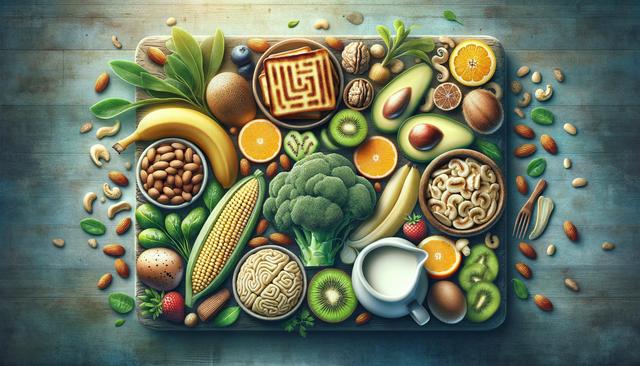1. Leafy Green Vegetables
Leafy greens such as spinach, kale, and collard greens are nutrient-rich foods that play an essential role in cognitive function. These vegetables are high in vitamin K, lutein, folate, and beta carotene — all of which have been associated with slower cognitive decline. Several studies suggest that individuals who consume multiple servings of leafy greens per week show signs of improved memory and mental clarity over time.
Some key nutrients in leafy greens include:
- Vitamin K: Supports brain cell structure and function.
- Folate: Helps reduce levels of homocysteine, an amino acid linked with cognitive decline.
- Lutein: Associated with long-term brain health.
Incorporating leafy greens into your diet is simple. Add them to smoothies, salads, or sauté them as a side dish. Regular intake may contribute to improved memory retention, especially as part of a long-term healthy eating pattern.
2. Fatty Fish
Fatty fish such as salmon, trout, and sardines are highly regarded for their omega-3 fatty acid content. Omega-3s are vital for brain health, as they help build membranes around brain cells and reduce inflammation, which can contribute to cognitive decline. Consuming fatty fish regularly has been linked to slower age-related memory loss and better overall cognitive performance.
The brain relies on omega-3 fatty acids for proper function. These fats have been shown to:
- Support communication between brain cells.
- Reduce inflammation that may impair memory.
- Lower the risk of neurodegenerative diseases.
Experts often recommend eating at least two servings of fatty fish per week. For those who do not consume fish, plant-based sources like flaxseeds and walnuts, or omega-3 supplements, may be considered as alternatives.
3. Berries
Berries, particularly blueberries, strawberries, and blackberries, are rich in antioxidants, especially flavonoids, which have been shown to improve brain function. These compounds help reduce oxidative stress and inflammation, both of which are known to contribute to aging and cognitive decline.
Benefits of regularly consuming berries include:
- Improved communication between brain cells.
- Delayed brain aging and enhanced memory.
- Protection against free radical damage.
Including a variety of berries in your diet can be as easy as adding them to breakfast cereals, yogurt, or enjoying them as a snack. Research indicates that even small daily servings can have a noticeable effect on memory over time.
4. Nuts and Seeds
Nuts and seeds are excellent sources of vitamin E, healthy fats, and antioxidants — all beneficial for brain health. Vitamin E, in particular, has been linked to less cognitive decline as people age. Almonds, walnuts, sunflower seeds, and flaxseeds are among the most nutrient-dense options for supporting memory and mental clarity.
Regular consumption of nuts and seeds may:
- Provide essential nutrients that support brain cells.
- Protect against oxidative stress and inflammation.
- Enhance memory and cognitive processing speed.
They are also versatile and easy to incorporate into the diet. Try adding a handful to oatmeal, salads, or as a standalone snack. The combination of healthy fats and antioxidants makes nuts and seeds a valuable addition to a brain-healthy eating plan.
5. Whole Grains
Whole grains such as oats, brown rice, quinoa, and whole wheat bread provide a steady source of glucose, which the brain uses for energy. Unlike refined grains, whole grains offer fiber, B vitamins, and other nutrients that support neurological function. A diet rich in whole grains has been linked with better concentration and reduced risk of memory-related issues.
Key benefits of whole grains include:
- Improved blood flow to the brain.
- Stable energy levels to support mental performance.
- Support for neurotransmitter function through B vitamins.
Choosing whole grains over refined versions helps maintain consistent brain fuel throughout the day. This can result in better focus, clarity, and overall cognitive performance, particularly in aging adults.
Conclusion: Nourishing Your Memory Through Food
While no single food can prevent memory loss entirely, incorporating a variety of nutrient-rich foods can contribute to long-term brain health. Leafy greens, fatty fish, berries, nuts, and whole grains each offer unique benefits that support memory and cognitive function. Making these foods a regular part of your diet is a practical and natural way to protect your mental sharpness as you age. Balanced nutrition, combined with other healthy lifestyle habits like regular physical activity and mental engagement, can significantly influence overall brain wellness.


